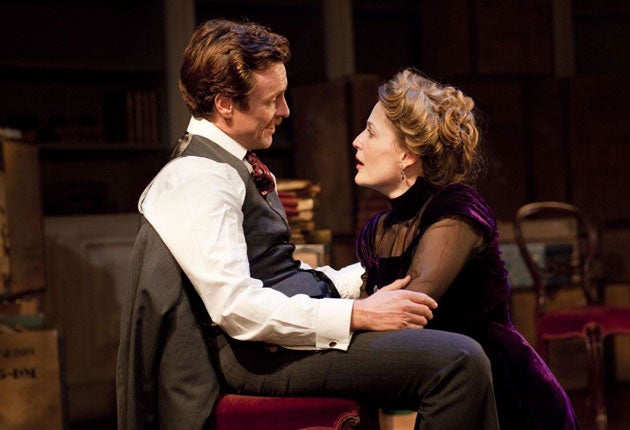First Night: A Doll's House, The Donmar, London
Anderson brings an X-factor to Ibsen revival

There's an odd credit in the back of the programme to this powerful revival by young film-maker Kfir Yefet of Ibsen's breakthrough play about a doomed and argumentative marriage starring the luminescent Gillian Anderson of X-Files fame: the historical adviser is none other than Ffion Hague, wife of the former Conservative Party leader and published chronicler of Downing Street marriages.
Does that explain why Zinnie Harris has translated her new version from late 19th century Norway to Edwardian London in 1909 and shifted the tale of intrigue, fraud and betrayal from the world of finance to that of politics?
It's only a partially successful transposition, and lines like: "I've got him by his testicles," sound distinctly odd, even when uttered by former Doctor Who Christopher Eccleston, full of ire and splutter as Neil Kelman, a Lancastrian politician hastily removed from office after certain "allegations" and a huge falling out with the PM.
In Ibsen, the catastrophe is impelled by a newly appointed bank manager's wife, Nora, being verbally abused by her own husband when the deal she struck to save him in the depths of a nervous breakdown is exposed as a fraud. She gets up and goes, leaving him and the children. That door bang echoes down the last century's drama, and still today.
At the Donmar, Anderson's beautiful butterfly Nora is a politician's wife – Toby Stephens' magnificently haughty and ambitious new cabinet minister Thomas Vaughan declaring (to huge laughs) that "our staple is trust; it's all we have to offer the public" – who has worked without him knowing and even bought second-hand clothes which he wears and she repairs to pay off the debt.
But she still owes the last payment, and it's that hinge of uncertainty that defines the drama. The house Nora and Thomas are moving into – Anthony Ward's design is a vast circular library of empty bookshelves, packing cases, an upper level glimpsed through an oval skylight – was once in the possession of the now-ruined Kelman, barrister Krogstad in Ibsen.
This gives the play an added twist of bitter displacement, though it's not one that serves it all that well. The play happens over Christmas, and that cheerless irony is beefed up with Anderson entering and leaving in a filmic cross-fade, Stephens hustling through the proprieties with an eye on his political future and expenses.
Stalking the scene is Anton Lesser's devoted Dr Rank, dying of cancer but maintaining one of those ambiguous domestic triangles Ibsen excelled at. Anderson is the equal of the most vulnerable Noras I've seen – Cheryl Campbell at the RSC, Kelly Hunter on tour – but she's easily the most touchingly innocent, and the most beautiful.
It's worth noting the superb playing of Eccleston and Tara Fitzgerald (once a fine Nora herself at the Birmingham Rep) as his true love, Mrs Lyle (Mrs Lynde in Ibsen), and Nora's best friend, in the sub-plot recipe for a slightly more ideal marriage. The play still bristles with hurt, relevance and anger, and didn't really need the political patina. Nice job, though.
To 18 July 0871 297 5454; www.donmarwarehouse.com
Subscribe to Independent Premium to bookmark this article
Want to bookmark your favourite articles and stories to read or reference later? Start your Independent Premium subscription today.

Join our commenting forum
Join thought-provoking conversations, follow other Independent readers and see their replies